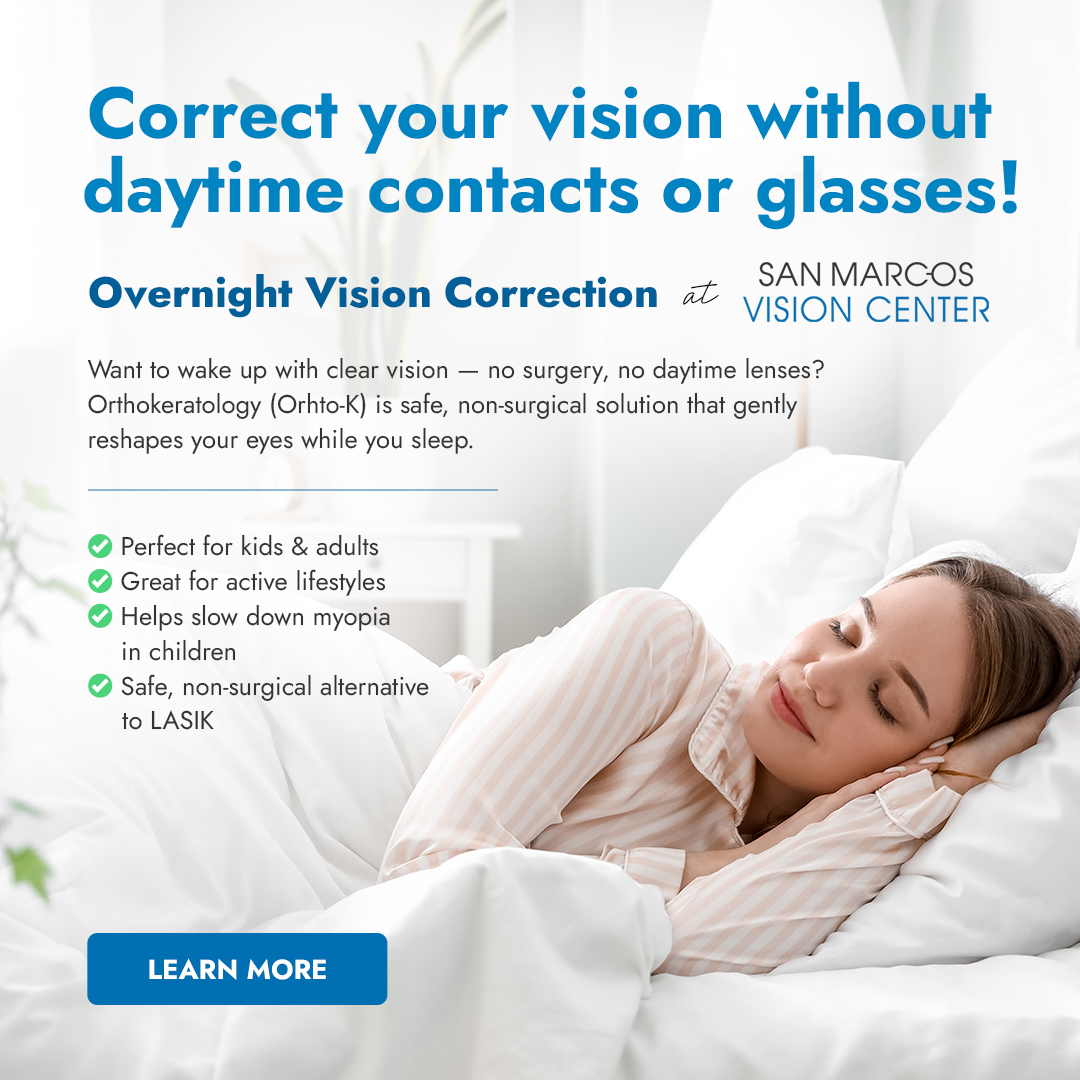
Blue light-blocking glasses capture the attention of those concerned with their eye health. This specific type of glasses can filter out the blue light emitted from digital screens and artificial lighting.
Blue light, a component of the visible light spectrum, emanates from the sun, digital devices, and LED lighting. Its pervasive nature raises concerns about potential eye strain and disruption to sleep patterns.
Understanding Blue Light and Its Effects
Blue light is part of the visible light spectrum, which we can see. It ranges from approximately 380 to 500 nanometers and is a significant component of both natural and artificial light sources.
Blue light is emitted by the sun and is also present in various artificial light sources such as LED lamps, energy-saving light bulbs, and electronic displays like smartphones, TVs, and tablets.
Effects on Vision and Eye Health
Blue light exposure has been linked to several negative effects on vision and eye health:
Digital Eye Strain: Staring at screens for too long can make our eyes tired, dry, and blurry because the blue light from screens is very strong and has a tiny wavelength.
Retinal Damage: Really strong blue light, especially with wavelengths from 415 to 455 nanometers, can be harmful and damage the retina. This could make it more likely for someone to get age-related macular degeneration (AMD), a condition that affects vision as we age.
Cataracts and Dry Eye: Exposure to blue light has been linked to an increased risk of cataracts and dry eye.
Sleep Disturbances: Blue light exposure, especially at night, can disrupt the body's natural sleep-wake cycle by suppressing the release of melatonin, leading to sleep problems and reduced alertness.
Positive Effects
Despite the negative effects, blue light also has some positive benefits:
Alertness and Mood: A little bit of blue light can help keep your body's sleep and wake cycle on track, make you more alert, and lift your spirits.
Cognitive Function: Blue light exposure has been linked to improved memory and cognitive function.
Prevention and Mitigation
To reduce the negative effects of blue light exposure, several measures can be taken:
Watch Your Screen Time: Try not to use screens too much, mainly before bedtime. Apps or settings that tone down blue light can help.
Blue Light Filtering Glasses: Wearing glasses that filter out blue light or putting a filter on your screen can block some of the blue light from getting to your eyes.
Night Mode: Adjusting screen settings to night mode, which reduces blue light emission, can also help.
Eye Care: Regular eye exams and proper eye care practices can help prevent and manage blue light-related eye problems.
The Science Behind Blue Light Blocking Glasses
Blue light-blocking glasses work by filtering out high-energy visible (HEV) blue light, which ranges from 400 nm to 450 nm in wavelength. This blue light is emitted by digital screens, LED lighting, and the sun. The lenses of blue light-blocking glasses either reflect or absorb this blue light, preventing it from reaching the eyes.
There are two main types of blue light-blocking lens technology:
Reflective Coatings: These lenses have a blue-light-reflecting coating that can appear bluish. They can block around 10% of blue light.
Absorptive Lenses: These lenses feature a yellow, amber, or orange embedded tint that absorbs blue light. Most absorptive lenses block at least 35% of blue light, with some blocking up to 98%. The more blue light they block, the more orange the lenses look.
Effectiveness
How well blue light-blocking glasses work depends on how good the lenses are and which blue light wavelengths are made to stop. Rigorous testing and certification are crucial to ensure the glasses provide the intended level of protection.
Labs use spectrophotometry to check if the glasses block harmful types of blue light. This testing helps to show how effective the glasses are at stopping eye strain, sleep problems, and other long-term eye issues caused by too much blue light.
Health Benefits of Wearing Blue Light Blocking
Wearing blue light-blocking glasses can provide several health benefits:
Protection Against Eye Strain
Staring at screens pumps out blue light, which can make your eyes feel pooped out and sore. Blue light glasses help by keeping this blue light away from your eyes, which makes them less tired. This can help you stay focused for longer without getting headaches.
Improvement in Sleep Quality
Too much blue light late in the day can mess with your sleep cycle and make it tough to nod off. Wearing blue light-blocking glasses in the evening blocks this blue light, helping maintain normal sleep patterns and improving sleep quality.
Potential Reduction in the Risk of Eye Diseases
Experts are still figuring this out, but some think that lots of blue light might lead to eye problems, such as cataracts and macular degeneration, as you get older. Blue light-blocking glasses may mitigate this risk by limiting blue light reaching the retina.
Benefits to Mental Health
When you sleep well, and your eyes aren't strained, you're likely to feel less cranky and more able to focus. So, blue light glasses could make you feel more chipper overall because you're less tired and stressed.
Additional Advantages Beyond Health
Wearing blue light-blocking glasses can provide several benefits beyond health:
Increased Productivity and Focus
Blue light-blocking glasses can help reduce eye strain and improve visual clarity, increasing productivity and focus during extended screen use. By blocking blue light, these glasses can reduce distractions and promote a more comfortable visual environment, allowing users to stay focused on their tasks for longer.
Comfort During Long Periods of Screen Use
Blue light-blocking glasses can make screen time more comfortable by reducing eye strain and dryness. This is especially important for individuals who spend extended periods using digital devices, as it can help alleviate discomfort and fatigue.
Improved Visual Clarity and Contrast
Blue light-blocking glasses can enhance visual clarity and contrast by reducing the negative effects of blue light on the eyes. This can lead to better visual performance and reduced eye strain, making it easier to work or engage in activities that require visual attention.
Choosing the Right Blue Light Blocking Glasses
Selecting the appropriate blue light-blocking glasses involves careful consideration of features and functionality. Consumers must evaluate factors such as:
Blue Light Filtering Quality: Look for glasses that clearly describe how well they filter blue light. Good lenses block a lot of harmful blue light but let the necessary blue light through.
Lens Coating Type: Different lens coatings offer various benefits:
Anti-Reflective (AR) Coating: Reduces glare from screens and artificial lighting, making it easier on the eyes.
UV Protection: Some blue light glasses also protect against ultraviolet (UV) rays, which can be harmful outdoors.
Scratch Resistance: Consider glasses with scratch-resistant coatings to ensure durability.
Lens Color and Clarity: Glasses come in different colors like clear, amber, or yellow. Clear lenses don’t change how colors look, which is great for work settings. Amber or yellow lenses are better for nighttime use as they can help you sleep better by reducing blue light.
Frame Style and Comfort: Pick glasses that look good on your face and feel comfortable, especially if you wear them a lot. Light frames with adjustable nose pads are usually more comfortable.
Blue Light Blocking Percentage: Check how much blue the glasses block. Most block about 30-40%, but better ones can block up to 95%.
Prescription or Non-Prescription: Blue light-blocking glasses are available with and without prescription lenses. You can opt for prescription blue light-blocking glasses if you require vision correction. Non-prescription versions suit those with 20/20 vision who want to protect their eyes from blue light.
Brand Reputation and Reviews: Look up the brand and check what other buyers say about the glasses to make sure you're buying from a trusted brand.
Budget Considerations: There are glasses for every budget. More expensive ones might have extra features and block more blue light, but you can still find effective glasses that are more affordable. Decide how much you want to spend and look for glasses that fit your budget.
Recommendations for Different User Needs
Recommendations for blue light-blocking glasses vary for different users.
Gamers: Look for blue-light-blocking glasses with high blue-light filtering percentages and anti-reflective coatings to reduce glare and improve screen visibility.
Office Workers: Choose blue light-blocking glasses with UV protection and scratch-resistant coatings to ensure long-term durability and eye protection.
Programmers and Corporate Employees: Opt for blue light-blocking glasses with anti-reflective coatings and high blue light filtering percentages to reduce eye strain and improve screen comfort.
Tips for Verifying the Quality of Blue Light Blocking Glasses
Exploring the market for blue light-blocking glasses necessitates attention to detail and an understanding of key features.
Check the Blue Light Blocking Percentage: Ensure the glasses filter out a significant portion of blue light, ideally 30-40% or more.
Verify Lens Coatings: Look for anti-reflective, UV protection, and scratch-resistant coatings to ensure comprehensive eye protection.
Research the Brand: Check the brand's reputation and customer reviews to ensure you purchase from a reputable source.
Check Warranty and Durability: Opt for glasses with a one-year warranty and durable materials to ensure long-term use.
Conclusion
Blue light-blocking glasses offer significant benefits for eye health and comfort. They reduce eye strain and improve sleep quality by filtering out harmful blue light from digital screens. These glasses are crucial for anyone looking to enhance their digital well-being.
We highly recommend that you consider blue light-blocking glasses. They serve as a protective measure against the potential risks of prolonged screen exposure. Adopt this practice to safeguard your vision and overall health.

 Specialty Contacts
Specialty Contacts





